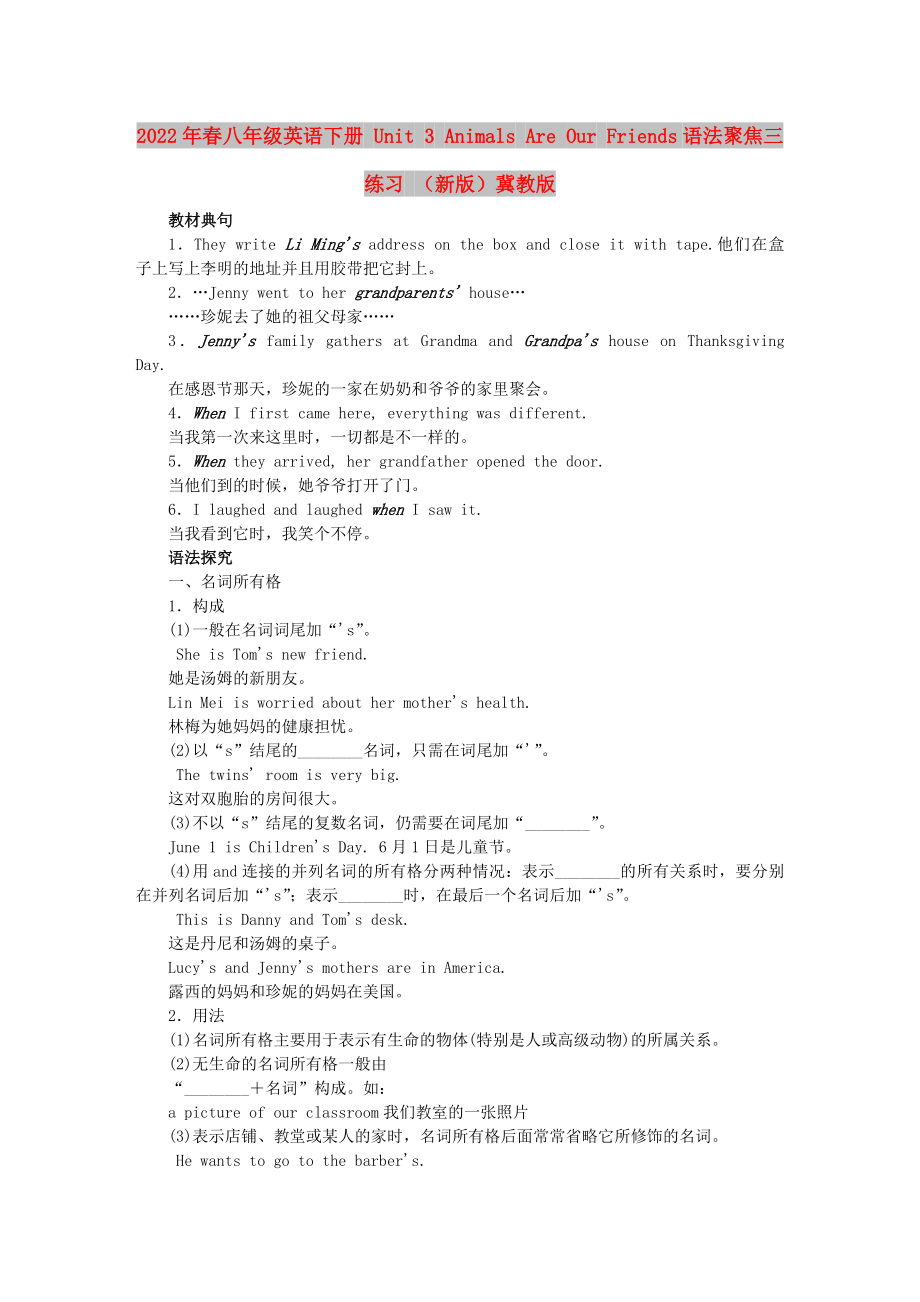《2022年春八年級(jí)英語下冊(cè) Unit 3 Animals Are Our Friends語法聚焦三練習(xí) (新版)冀教版》由會(huì)員分享��,可在線閱讀�����,更多相關(guān)《2022年春八年級(jí)英語下冊(cè) Unit 3 Animals Are Our Friends語法聚焦三練習(xí) (新版)冀教版(5頁珍藏版)》請(qǐng)?jiān)谘b配圖網(wǎng)上搜索���。
1�、2022年春八年級(jí)英語下冊(cè) Unit 3 Animals Are Our Friends語法聚焦三練習(xí) (新版)冀教版
教材典句
1.They write Li Ming's address on the box and close it with tape.他們?cè)诤凶由蠈懮侠蠲鞯牡刂凡⑶矣媚z帶把它封上����。
2.…Jenny went to her grandparents' house…
……珍妮去了她的祖父母家……
3.Jenny's family gathers at Grandma and Grandpa's house on Thanksgivin
2、g Day.
在感恩節(jié)那天���,珍妮的一家在奶奶和爺爺?shù)募依锞蹠?huì)���。
4.When I first came here, everything was different.
當(dāng)我第一次來這里時(shí),一切都是不一樣的�����。
5.When they arrived, her grandfather opened the door.
當(dāng)他們到的時(shí)候��,她爺爺打開了門。
6.I laughed and laughed when I saw it.
當(dāng)我看到它時(shí)�����,我笑個(gè)不停�。
語法探究
一、名詞所有格
1.構(gòu)成
(1)一般在名詞詞尾加“'s”����。
She is Tom's
3����、 new friend.
她是湯姆的新朋友。
Lin Mei is worried about her mother's health.
林梅為她媽媽的健康擔(dān)憂�。
(2)以“s”結(jié)尾的________名詞,只需在詞尾加“'”��。
The twins' room is very big.
這對(duì)雙胞胎的房間很大�。
(3)不以“s”結(jié)尾的復(fù)數(shù)名詞,仍需要在詞尾加“________”��。
June 1 is Children's Day. 6月1日是兒童節(jié)����。
(4)用and連接的并列名詞的所有格分兩種情況:表示________的所有關(guān)系時(shí),要分別在并列名詞后加“'s”;表示_____
4����、___時(shí),在最后一個(gè)名詞后加“'s”�����。
This is Danny and Tom's desk.
這是丹尼和湯姆的桌子����。
Lucy's and Jenny's mothers are in America.
露西的媽媽和珍妮的媽媽在美國。
2.用法
(1)名詞所有格主要用于表示有生命的物體(特別是人或高級(jí)動(dòng)物)的所屬關(guān)系����。
(2)無生命的名詞所有格一般由
“________+名詞”構(gòu)成。如:
a picture of our classroom我們教室的一張照片
(3)表示店鋪����、教堂或某人的家時(shí),名詞所有格后面常常省略它所修飾的名詞�。
He wants to go
5、to the barber's.
他想去理發(fā)店�。
(4)表示時(shí)間、距離��、集體、國家��、團(tuán)體等無生命的名詞也可用“'s”構(gòu)成所有格�����。
today's newspaper今天的報(bào)紙
(5)雙重所有格表示整體中的一部分��,結(jié)構(gòu)為“of+________”或“of+名詞性物主代詞”�����。
a book of my father's我父親的一本書
a friend of mine我的一個(gè)朋友
二�����、when 引導(dǎo)的時(shí)間狀語從句
1.用法
when 意為“當(dāng)……的時(shí)候”��,引導(dǎo)時(shí)間狀語從句時(shí)���,可以指時(shí)間點(diǎn),也可以指時(shí)間段�; 從句可以位于主句________,也可以位于主句________���。當(dāng)從句
6���、在前時(shí)���,主從句之間多用________隔開。
Someone knocked at the door when I was sleeping.
當(dāng)我正在睡覺時(shí)����,有人敲門。
When he es back, please tell me.
當(dāng)他回來時(shí)��,請(qǐng)告訴我��。
2.時(shí)態(tài)
一般來講�����,when 引導(dǎo)的時(shí)間狀語從句要遵循主����、從句時(shí)態(tài)相呼應(yīng)的規(guī)律: 即主句是一般現(xiàn)在時(shí)(包括祈使句和含有情態(tài)動(dòng)詞can, may, must等),從句也用________��;主句是________時(shí)�,從句也要用過去的時(shí)態(tài)���; 主句是一般將來時(shí),從句要用________表示將來�����。
I will be a tea
7���、cher when I grow up.
當(dāng)我長大了����, 我要做一名老師�����。
實(shí)戰(zhàn)演練
單項(xiàng)選擇
( )1.________ room is big and nice.
A. Kate's and Jane's
B. Kate's and Jane
C. Kate and Jane's
D.Kate and Jane
( )2. xx·涼山—How far is your home from the train station?
—It's about 20________ walk.
A. minute B. minutes
C.
8�����、minute's D. minutes'
( )3.________ mothers can't go to the parents' meeting because they are too busy.
A. Jack's and Paul
B. Jack's and Paul's
C. Jack and Paul's
D. Jack and Paul
( )4.—________ is ing. What can I get for my mother?
—What about a scarf?
A. Women's Day B. Woman's Day
C
9��、. Womens' Day D.Womans' Day
( )5.The online shop sells________ clothing at very good prices.
A. child and man's
B. children and men's
C. children's and men
D. children's and men's
( )6.Mr. Wang is an old friend ________ mine.
A.with B.of
C.to D.a(chǎn)t
( )7.Steve________ TV in the living r
10����、oom when his mother came in.
A. was watching B. watches
C .is watching D.watched
( )8.xx·重慶 Don't worry. Bill will help you look after your dog when you ________away on business.
A.a(chǎn)re B.were
C.will be D.have been
( )9.xx·濟(jì)南 Sun Hai________ his mother make dinner when his father got ho
11、me from work.
A. was helping B. helps
C. helped D. is helping
( )10.My mother________ dinner when I got home yesterday.
A. has cooked B. was cooking
C. will cook D. cooks
( )11.Birds ________ back to the north when it bees warm.
A.goes B.went
C.has gone D.will go
( )12.The teacher is already standing here.Do you know when she ________�����?
A.es B.came
C.is ing D.was ing
教師詳解詳析
【語法探究】
一�����、1.(2)復(fù)數(shù) (3)'s (4)各自��; 共有
2.(2)of (5)名詞所有格
二����、1.之前; 之后���; 逗號(hào)
2. 一般現(xiàn)在時(shí)��;一般過去時(shí)�����;一般現(xiàn)在時(shí)
【實(shí)戰(zhàn)演練】
1—5 CDBAD 6—10 BAAAB
11-12 DB
 2022年春八年級(jí)英語下冊(cè) Unit 3 Animals Are Our Friends語法聚焦三練習(xí) (新版)冀教版
2022年春八年級(jí)英語下冊(cè) Unit 3 Animals Are Our Friends語法聚焦三練習(xí) (新版)冀教版

